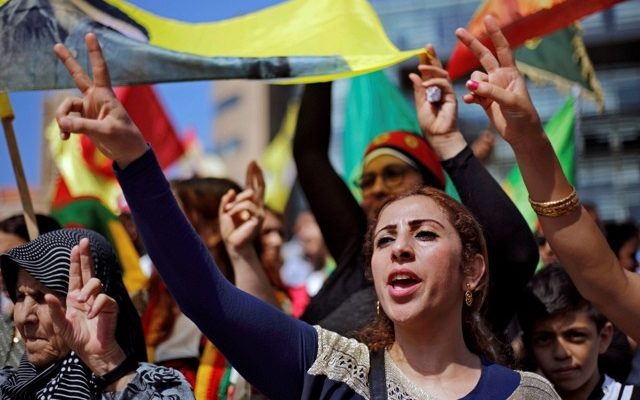The Kurds have voted on their future, while surrounding countries have threatened violence following the referendum. Israel remains mum on the issue.
Iraqi Kurds voted Monday in a landmark referendum on supporting independence, a move billed by the Kurdish leadership as an exercise in self-determination but viewed as a hostile act by Iraq’s central government. Neighboring Turkey even threatened a military response.
To Baghdad, the vote threatens a redrawing Iraq’s borders, taking a sizeable part of the country’s oil wealth with it. For Turkey and Iran, leaders feared the move would embolden their own Kurdish populations.
The vote — likely to be a resounding “yes” when official results are revealed later this week — is not binding and will not immediately bring independence to the autonomous region. Nevertheless, it has raised tensions and fears of instability in Iraq and beyond.
Turkey Threatens Military Action
Just hours after polls closed Monday night across the Kurdish region of northern Iraq, the Defense Ministry announced the launch of “large-scale” joint military exercises with Turkey.
Earlier in the day, President Recep Tayyip Erdogan of Turkey threatened the Kurdish region with military intervention. Iran — which also opposed the vote — held military exercises along their border Sunday.
Speaking in Istanbul, Erdogan said Turkey doesn’t recognize the referendum and declared its results would be “null and void.” He also suggested Turkey could halt the flow of oil from a pipeline from northern Iraq, a lifeline for the land-locked Kurdish region battling a severe economic crisis.
Turkey has urged the international community — and especially regional countries — not to recognize the vote and urged Iraq Kurdish leaders to abandon “utopic goals,” accusing them of endangering peace and stability for Iraq and the whole region.
“We could arrive suddenly one night,” Erdogan said, pointing to Turkish military exercises underway along Turkey’s border with the Iraqi Kurdish region.
“Our military is not (there) for nothing,” he added.
Risky Independence
The Iraqi Kurdish push for independence has been made even more combustible because Kurdish forces captured extensive territory in fighting against the Islamic State (ISIS) group in the past year. Those areas run from northwestern Iraq to the Iranian border on the east — including the oil-rich city of Kirkuk. Baghdad claims those territories, but the Kurds say they are part of their zone and some residents there are participating in the referendum.
An escalation in rhetoric within Iraq set the stage for increased tensions as Iraqi Kurds lined up to vote.
The Kurdish region’s president, Masoud Barzani, and Iraqi Prime Minister Haider al-Abadi both threatened to use force ahead of Monday’s vote.
Barzani softened his tone before he voted. He told a news conference Sunday that he believed the vote would be peaceful but acknowledged the path to independence would be “risky.”
“We are ready to pay any price for our independence,” he said.
Al-Abadi had said on the eve of the referendum that the vote “threatens Iraq” and “is a danger to the region.”
“We will take measures to safeguard the nation’s unity and protect all Iraqis,” he warned in a televised address from Baghdad.
US, UN Oppose the Vote
The United States and United Nations both opposed the vote, describing it as a unilateral and potentially destabilizing move.
US State Department spokeswoman Heather Nauert said the US wouldn’t alter its “historic relationship” with Iraqi Kurds but the referendum would increase hardships for the Kurdish region of Iraq. She said the Islamic State group and other terrorists are hoping to “exploit instability and discord.”
Statements from UN Secretary-General Antonio Guterres expressed regret that the vote was held and said issues between Iraq’s federal government and Kurdish region should be resolved through dialogue.
The promise of an independent state has long been at the center of Iraqi Kurdish politics. When colonial powers drew the map of the Middle East after World War I, the Kurds were divided among Turkey, Iran, Syria and Iraq.
That dream was evident among some of the voters in the disputed city of Kirkuk.
“I feel so great and happy. I feel we’ll be free,” said Kurdish resident Suad Pirot after voting. “Nobody will rule us. We will be independent.”
The oil-rich city has large Kurdish, Arab, Turkmen and Christian communities, and it has seen some low-level clashes in the days leading up to the vote. A curfew was imposed Monday evening for fear of more violence.
‘This is a Division of Iraq’
Baghdad residents strongly criticized the referendum, saying it would raise sectarian tensions and create an “Israel in Iraq.”
“This is a division of Iraq,” said journalist Raad Mohammad. Another Baghdad resident, Ali al-Rubayah, described the vote as a “black day in the history of the Kurds.”
Lawyer Tariq al-Zubaydi said the referendum was inappropriate amid the “ongoing threat of terrorism and Islamic State” terrorists.
“The country is going through a difficult period. This requires a coming together of our efforts, he said. “A unified country is better for all.”
Israel Stays Mum
The Israeli Prime Minister’s Office released a statement last week, during Netanyahu’s address at the UN General Assembly, saying the Jewish state “supports the legitimate efforts of the Kurdish people to attain a state of its own,” but rejects the PKK’s acts of terrorism. Since then, however, there has been no word on the issue from the Israeli leadership.
By: AP and World Israel News Staff





